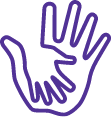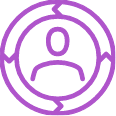Financials
Government Assistance
Government Financial Support
The Manitoba and Canadian government have several support programs to help you when you are not able to obtain employment. These programs might provide additional services like emergency funding, health and dental support, and funeral expenses.
Employment Income Assistance (EIA)
EIA assistance is for folks whose total cost of their family’s monthly basic needs and housing costs are more than their total income. The government does not consider debt, cell phones, cable, subscriptions, or car expenses as basic needs.
Eligibility
- Between 18 – 65 years old
- Live in Manitoba
- Not eligible for disability services
- In financial need
- Assets are $3,999 or less
- Willing to look for work
What you Receive
- basic needs support
- Essential health care needs
- Job Search Support
- Childcare expenses
How to Apply
- Book an appointment.
- Online: fill out an EIA intake form (opens in new window).
- In person (Winnipeg only): No dependents go to 111 Rorie Street. If you have dependants then go to 128 Market Avenue. (Outside of Winnipeg): Find the nearest location to you here (opens in new window).
- By phone: In Winnipeg call (204) 948-4000. Outside of Winnipeg call 1-855-944-811. Deaf or hard of hearing call 1-800-855-0511.
- Gather important documents and information (opens in new window).
- Attend your appointment. In your intake appointment, you will be asked to speak about your current situation. Some of the things you might be asked are:
- you and your family’s situation (children, spouse or partner)
- your housing situation (rent, experiencing homelessness, transitional housing)
- your income (money you earn or get from another source)
- your assets (savings, investments, items of value)
- your education & work experience and status.
- your plans to find work
- any medical conditions and health needs that may keep you from working
- any legal problems you have
Employability Assistance for People with Disabilities (EAPD)
This Program Helps You Explore
Eligibility
-
- A resident of Manitoba
-
At least one of the following disabilities: psychiatric, learning, and intellectual disabilities, physical, including hearing-related disabilities, spinal cord injuries, Vision Loss Rehabilitation – vision-related disabilities
- 16 years of age or older
- Able to work in Manitoba
What you Receive
-
- Basic living expenses
- They work with employers to make your work environment more accessible
- Provides training that meets the needs of the job you want
- Staff to help you with job searching, resume building and other employment skills.
How to Apply
- Gather important documents and information.
- Complete the application (opens in new window).
- Submit your application
Employability Assistance for People with Disabilities Provincial Services Branch 260–800 Portage Avenue Winnipeg, MB R3G 0N4 Fax: 204-948-1008
or by email
Community Living Disability Services (CLDS)
What You Receive from CLDS
-
- The space to talk about your goals and wishes, with program staff and your existing support network
- The information you need about available services/supports and funding options
- The encouragement to make decisions about your own life, including which programs you want to be involved with
- The amount of support you need to be happy and healthy while being active in your community and making new connections
Eligibility
-
-
-
- Have faced significant barriers to learning and completing daily tasks by yourself since a young age (before turning 18). For example, you require someone to help you meet your basic needs such as bathing, cooking, and cleaning.
- Are 18 years of age or older
- A Manitoba resident
-
-
-
- Are a Canadian Citizen and/or legally able to permanently live and work in Canada
- Have an established permanent residence off-reserve in Manitoba prior to referral or request for services (if you are of registered treaty status in Manitoba)
-
-
How to Apply
Step 1: Gather important documents
-
- Clinical Assessment Report is a behavioural assessment from your physician, registered psychologist, or school psychologist. They will be assessing your abilities and disabilities based on the following criteria:
-
- Do you have a disability that makes you eligible for CLDS
- How are you at feeding yourself;
- Are you able to take care of yourself living alone?
- Are you able to work, how much and what special accommodations you might need?
- Is your safety at risk without additional support?
- The length of time you’ve been facing these challenges.
-
- Clinical Assessment Report is a behavioural assessment from your physician, registered psychologist, or school psychologist. They will be assessing your abilities and disabilities based on the following criteria:
Step 2: Download and fill out the application form (opens in new window):
Step 3: Visit a CLDS office (opens in a new window)with your completed application and submit it in person to an available worker. You can also call ahead to the closest location, to see when the best time to come in would be and/or if its staff prefers to have applications sent via mail.








